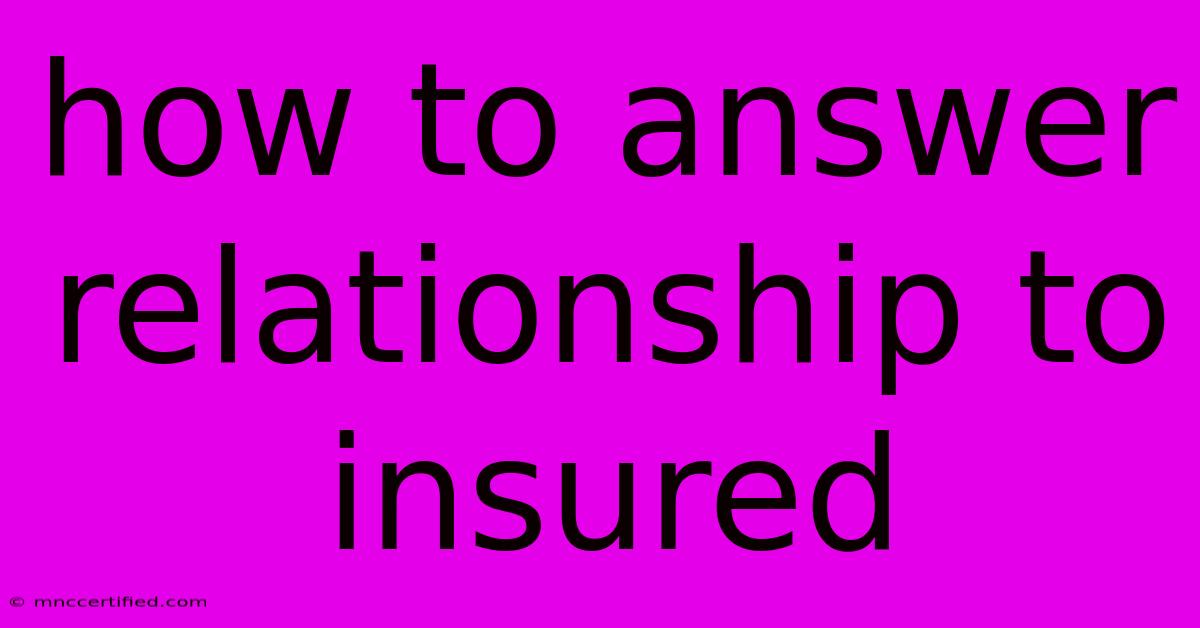How To Answer Relationship To Insured

Table of Contents
Navigating the "Relationship to Insured" Question: A Comprehensive Guide
When applying for insurance, you'll often encounter the question "Relationship to Insured." This seemingly simple query can sometimes cause confusion, especially if you're dealing with multiple policyholders or unfamiliar insurance terminology. This guide aims to demystify this question and equip you with the knowledge to answer it confidently and accurately.
Understanding the "Insured" and the "Relationship"
"Insured" refers to the individual or entity covered by the insurance policy. This could be a person, a business, or even a property. The "Relationship to Insured" question seeks to establish your connection to the person or entity named on the policy.
Here's a breakdown of common relationships:
- Spouse/Partner: This refers to your legal spouse or partner.
- Child: This includes your biological, adopted, or stepchildren.
- Parent: This includes your biological, adoptive, or stepparents.
- Sibling: This refers to your brother or sister, whether full or half-sibling.
- Other Family Member: This encompasses extended family like aunts, uncles, grandparents, cousins, etc.
- Employee: This applies if you work for the insured entity, such as a company or organization.
- Owner: This is used if you have ownership of the insured property, like a house or vehicle.
- Resident: This option is chosen if you live at the insured property, but aren't the owner.
- Other: This category is for any relationship not explicitly listed, such as a friend, neighbor, or business associate.
Why is the "Relationship to Insured" Important?
Insurance companies need to understand the relationship between applicants and the insured for several reasons:
- Risk Assessment: Your relationship can influence the risk level associated with the policy. For example, a family member may be more likely to claim benefits than a stranger.
- Coverage Eligibility: Certain policies might have restrictions based on the applicant's relationship to the insured.
- Premium Calculation: The premium you pay might be adjusted depending on your relationship to the insured.
- Fraud Prevention: Insurance companies can use this information to identify potential fraud attempts.
Tips for Answering the "Relationship to Insured" Question Accurately
- Be Precise: Use clear and specific language to describe your relationship. Avoid vague terms like "friend" or "associate."
- Consider Multiple Relationships: If your relationship with the insured is multi-faceted, clarify all relevant aspects. For instance, if you're both an employee and a family member, list both.
- Check the Policy: Carefully review the policy documents to understand the specific requirements for the insured and the relationship question.
- Seek Clarification: If you're unsure about how to answer, don't hesitate to contact the insurance company or your agent for guidance.
Examples:
- "I am applying for life insurance on my spouse." Relationship to insured: Spouse.
- "I am applying for health insurance for my child." Relationship to insured: Child.
- "I am applying for auto insurance for a car I own." Relationship to insured: Owner.
- "I am applying for property insurance for my rented apartment." Relationship to insured: Resident.
Conclusion
The "Relationship to Insured" question is an essential part of the insurance application process. By understanding the concept, providing accurate information, and seeking clarification when needed, you can ensure your application is processed smoothly and efficiently.

Thank you for visiting our website wich cover about How To Answer Relationship To Insured. We hope the information provided has been useful to you. Feel free to contact us if you have any questions or need further assistance. See you next time and dont miss to bookmark.
Featured Posts
-
Williams Ready Team Name Vs Wright State
Nov 10, 2024
-
Fur Trading Family Wsj Crossword Clue
Nov 10, 2024
-
Real Madrid Vs Osasuna Live Stream Where To Watch
Nov 10, 2024
-
Salah Absent From Egypt Squad Liverpool Benefit
Nov 10, 2024
-
Live Score Pakistan Beats Australia In 3rd Odi
Nov 10, 2024